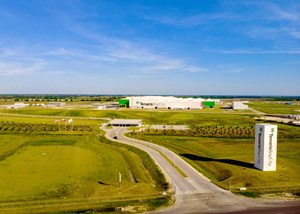(WO) – Tenaris’s Bay City, Texas, plant has received Leadership in Energy and Environmental Design (LEED) certification – the first pipe manufacturing facility in the United States to achieve this designation. The seamless mill was the company’s first green field project in the United States and was designed and built according to the most stringent environmental and safety standards.
Achieving LEED certification for an industrial process and facility is uncommon. The United States Green Building Council (USGBC), a leader in green building, has recorded less than 10 LEED-certified industrial projects in the States since 2010, with Tenaris’s Bay City mill the newest to join these ranks.
The USGBC rating system for Building Design and Construction (BD+C) evaluates projects in five categories: sustainable sites, water efficiency, energy and atmosphere, material and resources, and indoor environmental quality. Tenaris obtained 44 points with zero denied, earning a clean sheet in terms of credits acquired.
“This is an incredible achievement that speaks to the breadth of our commitment to incorporate the principles of sustainability into the areas our employees work to offer spaces that are safe and support an overall healthy environment, are highly efficient, and cost effective,” said Luca Zanotti, Tenaris US President.
The LEED certification of the mill encompassed a 1.35 million square foot area of the industrial site, including each stage of the manufacturing process: the hot rolling mill, the heat treatment and finishing.
A critical component of achieving LEED certification for industrial projects is demonstrating significant energy savings compared to similar facilities. Given intellectual property restrictions, data from other steel pipe manufacturers were not available for comparisons. Tenaris utilized comparable facilities within its own network with similar processes as a base. An analysis of Tenaris’s Bay City mill over a year’s time registered an average energy use reduction of about 54% over comparable lines from two of its mills in Veracruz, Mexico.
To determine the rate of consumption, the team had to track pipe production over 12 months, sorting like pipe diameters in Bay City to two other lines in Mexico, to analyze the electrical and gas use for the facility and determine an energy use metric for both gas and electricity to then define a specific rate of consumption per ton per facility. Tenaris’s third pipe mill in Veracruz was the first among the company’s network to obtain LEED certification in December 2012.
The Bay City mill recycles 95% of the water it uses for its industrial processes. Considering water used outside of its manufacturing process, the facility has reduced its water consumption by 35% versus baseline standards. About 38% of the materials used in the industrial building are of recycled material and about 96% of the materials used in the building were sourced locally, reducing environmental impacts associated with the transport of the materials.
Every single contractor that Tenaris has partnered with to work on its Bay City mill has been required to track and report information such as the origin of materials, quantity of the materials, the recycled content, have established waste management plans, indoor air quality management plans and more. Over the course of its four-year construction period, Tenaris trained approximately 20,000 people that took part in the Bay City mill project.
“This was a painstaking, multi-team effort over the course of 10 years. Our experts meticulously reviewed, tracked, organized, and reported on thousands and thousands of lines of data, translating into 5,000 man-hours for the certification. We are talking about every nut and bolt, paint, adhesive, light fixture and beyond were considered, calculated, and tracked to ensure it met LEED standards,” added Zanotti.
In the spring and summer of 2023, Tenaris obtained LEED Silver certification for the Bay City administrative building, its quality lab, and data center.
The $1.8 billion dollar investment is the most technologically advanced pipe manufacturing facility in North America and is the first mill US seamless pipe mill categorized by the Environmental Protection Agency as a minor source of emissions.




